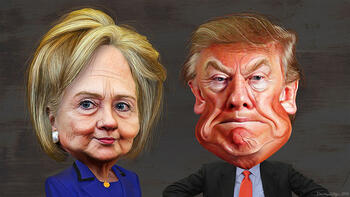
It took the Roman Republic five centuries to devolve into a centralized despotism. It may take ours roughly 240 years to get to the same place, but with decidedly less upside.
Concern over a crossing of a constitutional Rubicon – the northern Italian river whose passage by Julius Caesar and his legion in 49 B.C. occasioned the death of the Republic – has centered on Donald Trump. The Donald might not have conquered Gaul, or written a brilliant account of his exploits, but his Caesarist attributes – overweening self-regard, contempt for existing institutions and a touch of glamour – are all too obvious.
No surprise, then, that some on the left, perhaps rehearsing their roles as cheerleaders for Hillary Clinton, see Trump as a “tyrant” – a Caesar in training. Others see a reincarnation of Italy’s fascist dictator Benito Mussolini and link Trump’s success to that of the rising European populist parties, which progressives often label, sometimes accurately, as protofascist.
Many on the intellectual right also see in The Donald an imperial pretender. New York Times Republican stalwart Ross Douthat has called the likely GOP presidential standard bearer “a protofascist grotesque with zero political experience and poor impulse control.”
Read the entire piece at The Orange County Register.
Joel Kotkin is executive editor of NewGeography.com. He is the Roger Hobbs Distinguished Fellow in Urban Studies at Chapman University and executive director of the Houston-based Center for Opportunity Urbanism. His newest book, The Human City: Urbanism for the rest of us, will be published in April by Agate. He is also author of The New Class Conflict, The City: A Global History, and The Next Hundred Million: America in 2050. He lives in Orange County, CA.
Top image by DonkeyHotey (Hillary Clinton vs. Donald Trump - Caricatures) [CC BY-SA 2.0], via Wikimedia Commons













I can see how you might find
I can see how you might find the prospect of a Trump presidency disquieting. Plunging into the unknown is scary. And yet, in a way, what Trump is proposing is not a plunge into the unknown but rather a return to the known, to a world of sovereign democratic states committed to their own citizenry's welfare, from the too-hasty plunge we took twenty years ago into a truly unknown, namely, a global political economy based on the free movement of capital and labor without regard to domestic consequences.
In any event, when you compare Trump to figures like Mussolini and Hitler, you will find none of the warning signs you saw in their biographies: no hints of a fondness for violence or lawlessness, no penchant for radical as opposed to liberal political and economic ideas.
The world won't end if Britain exits the EU any more than if the US clamps down on mass low-skilled immigration and starts restricting trade with low-wage totalitarian states like China.
False Equivalence
There is a certain amount of false equivalence in the article. You seem to agree that Trump’s ideas represent an assault on individual rights, yet you assign equal moral blame to the people who are trying to stop him. I am not sure that is a fair equation. When someone suggests that my family should be tortured, he becomes the aggressor. If I spend my time trying to shout him down, my actions are defensive. It is specious to suggest that his right to free speech “trumps” mine.
Moreover, a billionaire with millions of followers has the ultimate tool of free speech: Anything he tweets is covered (breathlessly) by every news network on the planet. The people protesting against him - on the other hand - are reduced to caricatures by the media, and their valid concerns are reduced to “senseless violence” in the reporting.
The media does not owe protesters coverage, but what coverage they provide should be honest. So far, it has not been. The media has openly sided with Trump, and given an incorrect view of the protesters' concerns.
When you say that Hillary and Trump are promoting equally poor policies, you provide a level of respect to Trump's ideas that is completely un-earned.
In the long run, it may turn out that Hillary's ideas are just as bad, but at this point in the campaign, they are not. The few ideas that Trump has fleshed out (in the few areas where he does not directly contradict himself) are objectively untrue, unconstitutional, or previously failed.